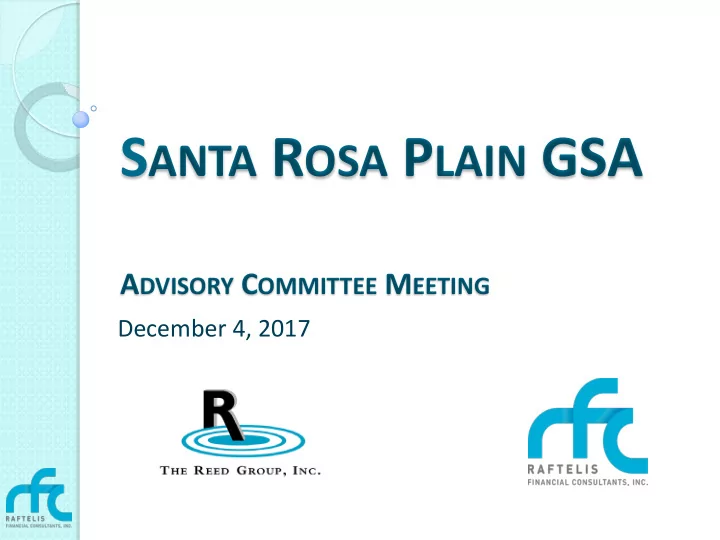

S ANTA R OSA P LAIN GSA A DVISORY C OMMITTEE M EETING December 4, 2017
12/4/17 Advisory Committee Meeting 2
Agenda 1. Introduction 2. Review study scope and approach 3. Prop. 218 and Prop. 26 overview 4. Regulatory fees (Prop. 26) requirements and process 5. Property related fees (Prop. 218) requirements and process 6. Public outreach and education 7. Q&A 12/4/17 Advisory Committee Meeting 3
FOC OCUS: US: Solely focused on financial, rate, who and management consulting for the We are water and wastewater industry NATI TIONAL & REGIONAL EXPERIENCE NCE: Unmatched in the industry with proven success for comparable utilities DEPTH TH: With 70 utility financial and management consultants, largest firm in the U.S. focused on these services COM OMMUN UNIC ICATION: N: Effective presentations to stakeholders supporting successful implementation THE E REED EED GR GROU OUP: : Local utility rate consultant with extensive experience in Sonoma County
Introduction Sally Van Etten – Project Manager ◦ 510.813.8704 ◦ svanetten@raftelis.com Bob Reed – Technical Review and Outreach Assistance ◦ 916.444.9622 ◦ bob@thereedgroup.org Public Outreach Strategy for Funding TBWB Strategies – Barry Barnes 12/4/17 Advisory Committee Meeting 5
Scope and Approach Advisory Committee Meetings Financial Plan Model Development ◦ Raftelis will design a financial plan model that projects revenues and expenses based on a variety of assumptions. Initial Fee/Charge Calculation ◦ Based on input from Advisory Committee meetings and results from the Financial Plan Model, Raftelis will design fees that serve as the primary cost recovery mechanism for the GSA. 12/4/17 Advisory Committee Meeting 6
Scope and Approach (Cont’d) Public Outreach ◦ Our public outreach will include stakeholder meetings, development of an outreach strategy for funding, and optionally the production and dissemination of voter education materials. Documentation and development of administrative record 12/4/17 Advisory Committee Meeting 7
Proposition 218 Passed in 1996 Called “Right to Vote on Taxes Act” Amends California Constitution Article XIII by adding Articles XIII C and XIII D Article XIII C requires voter approval for all local taxes and levies Article XIII D includes requirements for property fees and assessments including utility fees and charges 12/4/17 Advisory Committee Meeting 8
Proposition 26 Passed in 2010 Called the “Stop Hidden Taxes” initiative Amends Article XIII C by adding a new definition to the term “tax” such that a fee is a tax unless it falls under one of seven exceptions Regulatory fees is one of the categories, for recovery of “reasonable regulatory costs” 12/4/17 Advisory Committee Meeting 9
Regulatory Fees Water Code § 10730 ( Proposition 26) Agency may impose regulatory fees for permitting, extraction or other regulated activities both prior to or after adopting a sustainability management plan. Regulatory fees may be used to fund costs of preparing a groundwater sustainability plan. Fee revenue cannot exceed reasonable regulatory costs, but apportionment does not need to be “finely calibrated”. Revenue from these fees is limited to paying for preparing the sustainability plan, investigations, inspections, compliance/enforcement, program administration, and maintenance of prudent reserves. 12/4/17 Advisory Committee Meeting 10
Property Related Fees Water Code § 10730.2 (Proposition 218 ) Agency may impose property related fees after adoption of groundwater sustainability plan. Charges cannot exceed cost of service and must be tied specifically to revenue requirement model. Revenue requirements model: costs of chargeable activities, less other revenues, apportioned among users. There is precedent for charging groundwater related fees. There is currently a case before California Supreme Court that may change current options (City of San Buenaventura). 12/4/17 Advisory Committee Meeting 11
Data Needs Financial Plan Data ◦ Budget and costs by category ◦ Any other funding sources Parcel and Well Data ◦ List of parcels including parcel numbers, size, land use, zoning designation, crops grown ◦ Well production Number and capacity of wells Pumping data, if available Groundwater basin data 12/4/17 Advisory Committee Meeting 12
Questions, Answers & Feedback 12/4/17 Advisory Committee Meeting 13
Recommend
More recommend